Biden Speaks After U.S. Withdrawal from Afghanistan and Taliban Takeover: 'Gut-wrenching' but 'Cold Reality'
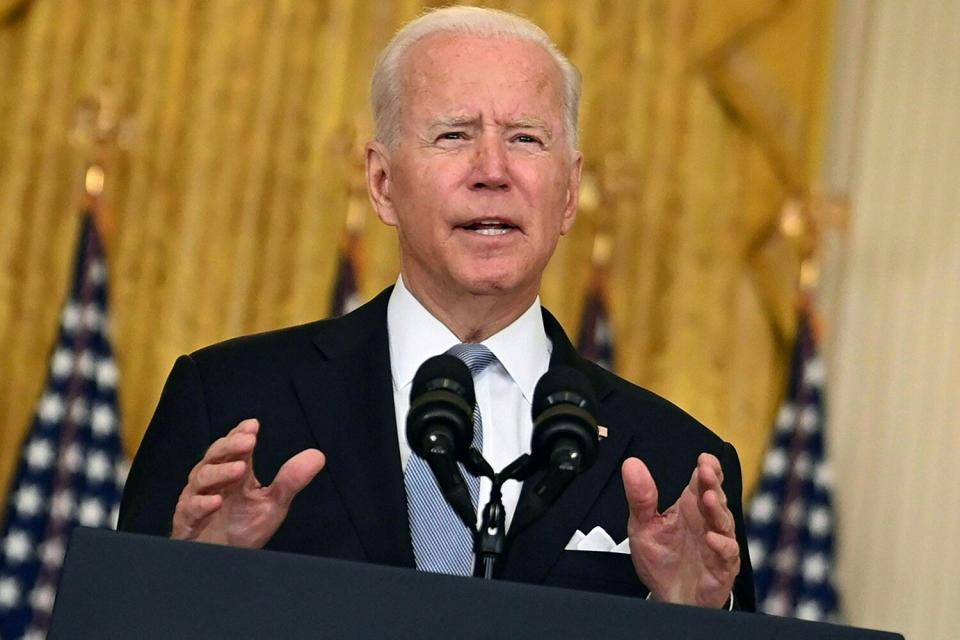
BRENDAN SMIALOWSKI/AFP via Getty President Joe Biden
President Joe Biden addressed the country on Monday afternoon in the wake of the U.S. withdrawal from Afghanistan and the almost immediate takeover of the country by the Taliban that for years had been kept at bay by American forces.
In a speech from the White House, Biden admitted there had been mistakes in how the military exit unfolded — which fueled a chorus of criticism at home — but he said he had not wavered in his estimation about what was best for the country after two decades of war abroad.
"I'm left again to ask of those who argue that we should stay: How many more generations of America's daughters and sons would you have me send to fight Afghanistan's civil war if Afghan troops will not? How many more lives, American lives, is it worth? How many endless rows of headstones at Arlington National Cemetery?"
"I'm clear on my answer," said Biden, 78. "I will not repeat the mistakes that we've made in the past."
"The scenes we're seeing in Afghanistan, they're gut-wrenching," the president said.
But that had not changed his mind.
"There was only the cold reality," he said: Withdraw under a deal with the Taliban that was negotiated by the Trump administration or resume the fighting, "lurching into the third decade of conflict."
RELATED: Scenes from the Startling Fall of Afghanistan
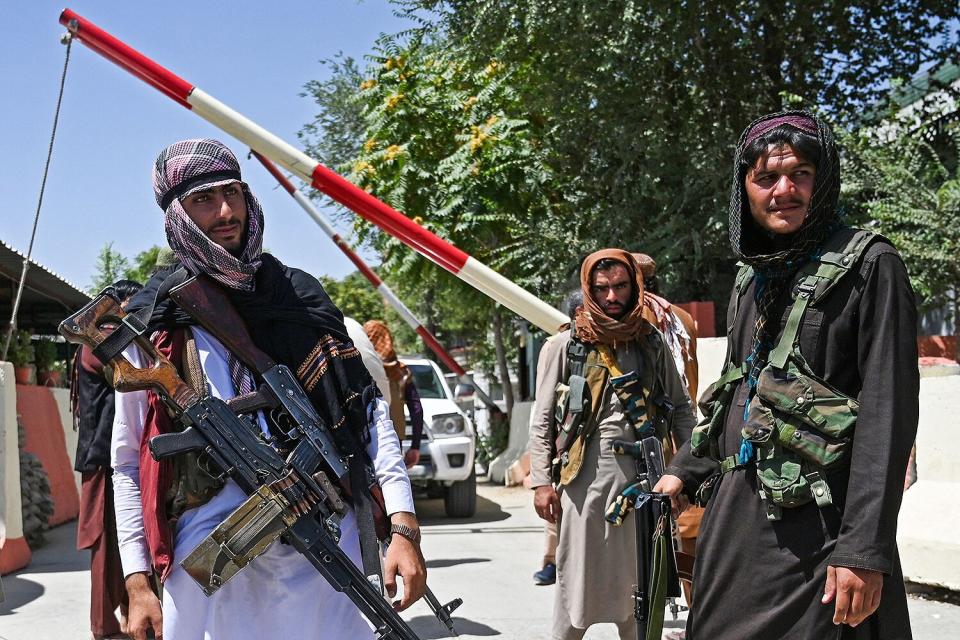
WAKIL KOHSAR/AFP via Getty
America's post-9/11 goals of eradicating terror networks and tracking down Osama bin Laden had long since been achieved, Biden said.
The pursuit of nation-building in Afghanistan was, in his words, folly.
"I stand squarely behind my decision," he said. "After 20 years, I've learned the hard way that there was never a good time to withdraw U.S. forces."
The twin developments of the military exit and resurgence of the insurgency — though anticipated — startled many around the country, catching the Biden White House off guard and drawing sharp rebuke from Republicans and even some Democrats, including over what critics called the abandonment of local allies.
The administration's bureaucratic failure to retrieve and relocate Afghan allies drew bipartisan scorn as well.
Tens of thousands of people, including some U.S. citizens and numerous Afghans who risk retribution, are reportedly still seeking to leave the country and hoping for assistance.
"The truth is, this did unfold more quickly than we anticipated," Biden said Monday, pointing the blame for the timeline toward a dysfunctional Afghan military and political system (an assessment some experts say ignores how the Afghan people have suffered most of the consequences and casualties).
"If anything, the developments of the past week reinforced that ending U.S. military involvement in Afghanistan was the right decision," Biden argued in his speech in an implicit response to other officials who said his exit needed to be rethought to avoid ruin.
The upheaval of America's withdrawal returned the country's attention to a seemingly intractable conflict to which it had long grown resigned and reignited once-familiar debates about the role and scope of American military in the Middle East and the country's responsibility for its past intervention.
As recently as last month, Biden insisted to reporters that it was "highly unlikely" the Taliban would so quickly take over Afghanistan and he vowed that the U.S. exit would not touch off a scramble like when the military left Saigon at the close of the Vietnam War five decades ago.
He was reassuring about the capabilities of the Afghan military and the orderliness of needed evacuations.
Biden was wrong.
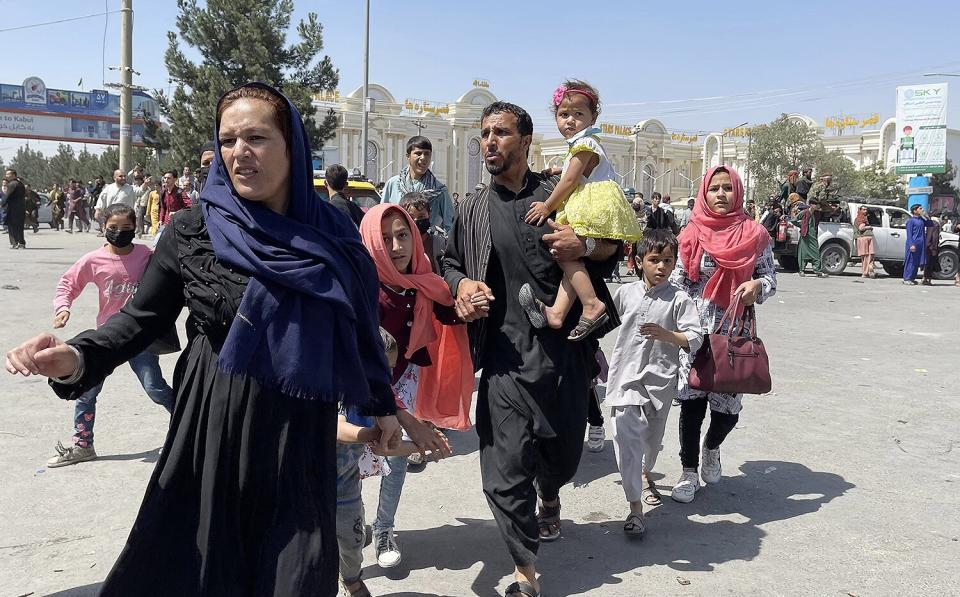
Haroon Sabawoon/Anadolu Agency via Getty
RELATED: People Fall to Their Deaths from Departing Plane amid Chaos and Desperation at Afghanistan Airport
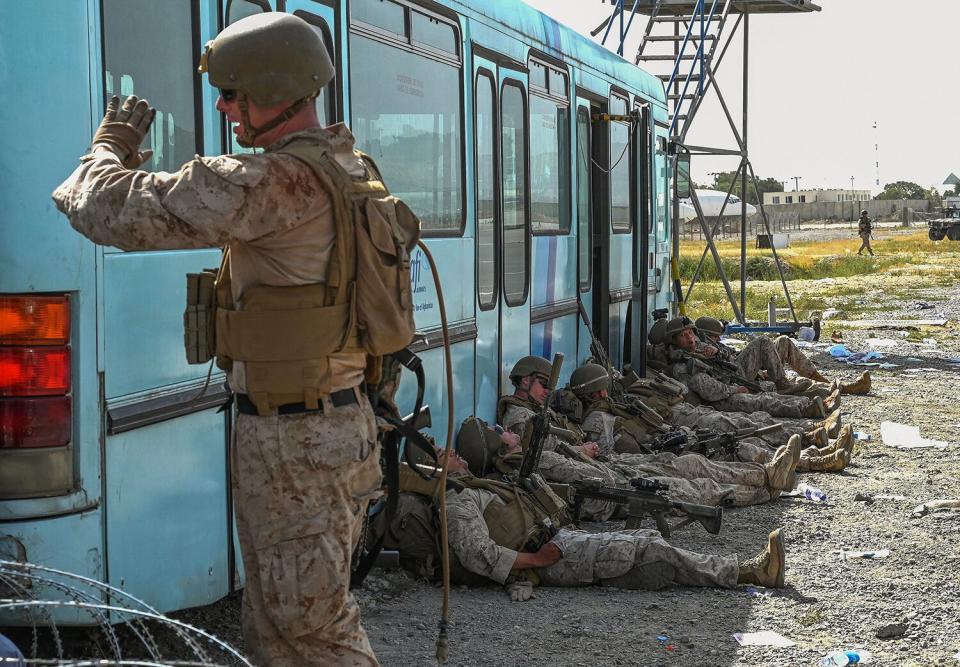
WAKIL KOHSAR/AFP via Getty
As he acknowledged on Monday, the Taliban met little resistance from Afghan forces as they swept across the country in recent days, arriving in the capital, Kabul, over the weekend as President Ashraf Ghani fled.
As the Taliban closed in, American forces were left to quickly pivot to evacuate embassy officials and allies and to ensure they retained sufficient control of Kabul air space.
In his speech Monday Biden said he was temporarily increasing American troops in Afghanistan to about 6,000 to secure the evacuating of citizens and allies and that the government would also continue to work to help certain vulnerable Afghans leave the country.
He noted the "concerns about why we did not begin evacuating Afghans — civilians — sooner," and he maintained that America remained committed to ensuring the stability and the "basic rights of the Afghan people."
But, Biden said, the U.S. military would continue its exit once the evacuations were complete.
"The events we're seeing now are sadly proof that no amount of military force would ever deliver a stable, united and secure Afghanistan," he said.
"I made a commitment to the American people when I ran for president that I would bring America's military involvement in Afghanistan to an end. And while it's been hard and messy and, yes, far from perfect, I've honored that commitment," he said.
Amid the scenes of chaos, despair and panic — and the specter of more violence and repression under the theocratic Taliban regime — Biden and his administration have said their position remains the same: There was no use remaining in the country after a 20-year conflict that had strayed beyond the counterterrorism offensive sparked by the attacks on Sept. 11, 2001.
What's more, Biden said in a statement over the weekend, the terms and timing of the withdrawal were largely set in place by predecessor Donald Trump, who had campaigned on ending America's involvement in Afghanistan and whose administration negotiated directly with the Taliban before sealing an agreement with them last year.
Biden's critics — including Mark Esper, one of Trump's defense secretaries — responded by saying he should not have honored the terms of such a deal.
"Both presidents Biden and Trump had the right goal in mind — ending America's longstanding presence in Afghanistan. But both also failed to pursue that goal in the right way," Esper tweeted on Sunday. "By pressing for a precipitous withdrawal of U.S. forces, rather than leveraging that military muscle to compel Taliban compliance with the 2020 peace agreement, both presidents hastened the Afghan government's collapse."
RELATED: Malala Yousafzai 'Deeply Worried About Women, Minorities' as Taliban Seizes Power in Afghanistan
"Difficult days are ahead for the Afghan people, who deserved far better leadership than what they had," Esper wrote on Twitter. "A humanitarian crisis is now unfolding before us."
Leading Republicans invoked the fall of Saigon at the end of the Vietnam War in 1975 and said the rapid removal of U.S. forces would seriously weaken the country's international standing in the eyes of other adversaries.
They said Biden's handling of the Afghanistan exit should be a stain on his record.
"America's two-decade involvement in Afghanistan has had many authors. ... But as the monumental collapse our own experts predicted unfolds in Kabul today, responsibility rests squarely on the shoulders of our current Commander-in-Chief," Senate Minority Leader Mitch McConnell said in a statement.
White House officials, in their defense, essentially asked: What else was there to do?
They said the post-2001 work to incubate a stable democratic government and robust security force in Afghanistan had never truly taken root, owing to a complicated mix of geopolitical factors and a succession of strategic failures and despite billions in aid and thousands of dead, both American and Afghan.
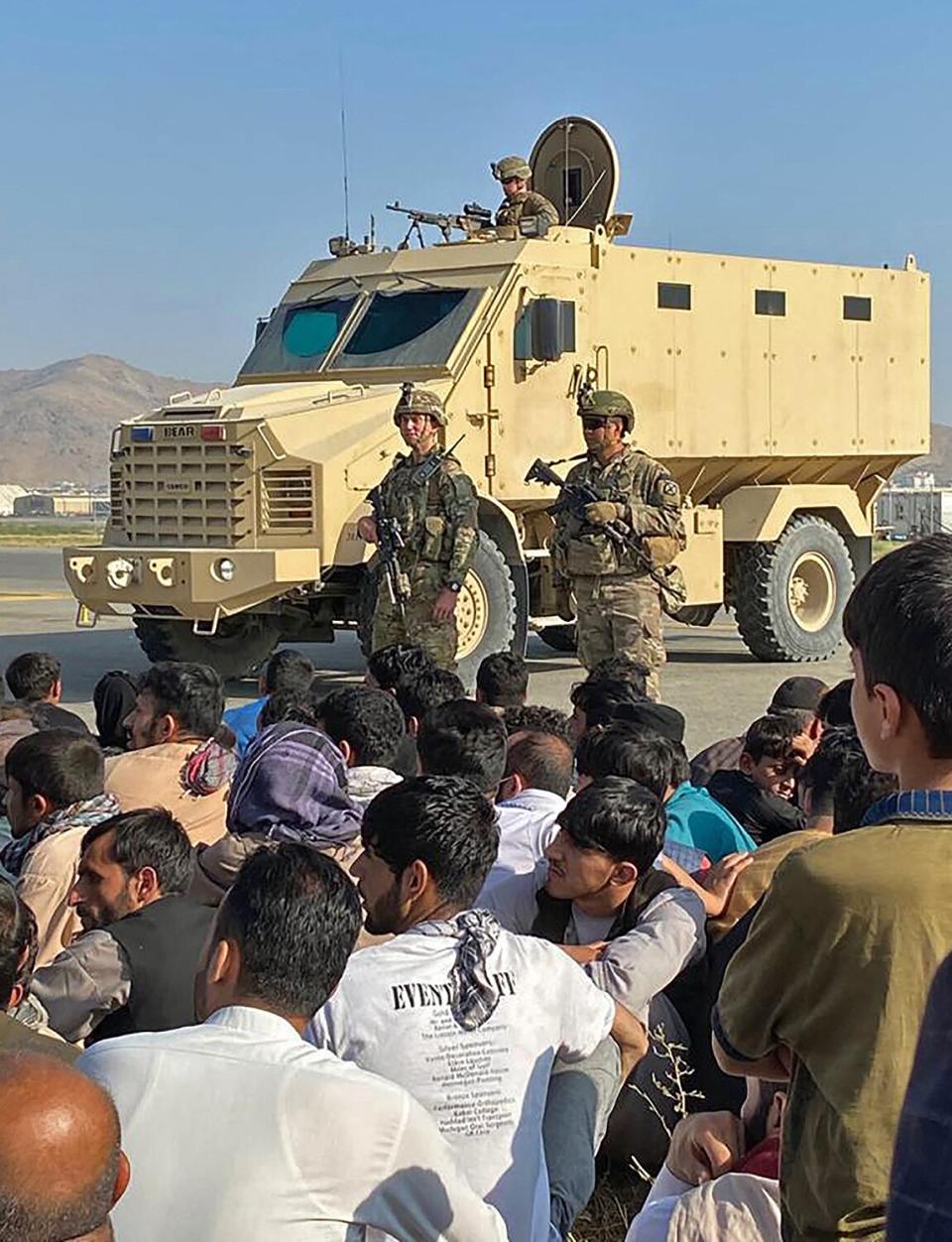
SHAKIB RAHMANI/AFP via Getty
Every president since George W. Bush, who oversaw the invasion of Afghanistan, has in one way or another tried to curb the U.S. role there.
The war — which became increasingly divisive, Americans said in polls — no longer served the country's interests, Biden argued after taking office.
"The president had bad choices. And the choice he made, which was to bring U.S. forces home, to get us out of that civil war, to get our diplomats out of the embassy and to ultimately ask the Afghans to step up and fight for themselves, it is heartbreaking to see what is happening in Kabul, but the president had to make the best possible choice he could and he stands by that decision," Biden's national security adviser, Jake Sullivan, said on Today on Monday.
"I'm now the fourth United States president to preside over American troop presence in Afghanistan: two Republicans, two Democrats," Biden said in April. "I will not pass this responsibility on to a fifth."
On Monday, he said, "I'm deeply saddened by the facts we now face. But I do not regret my decision."

 Yahoo Finance
Yahoo Finance 